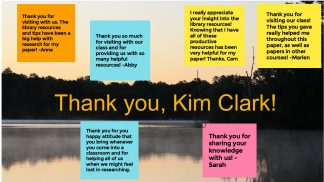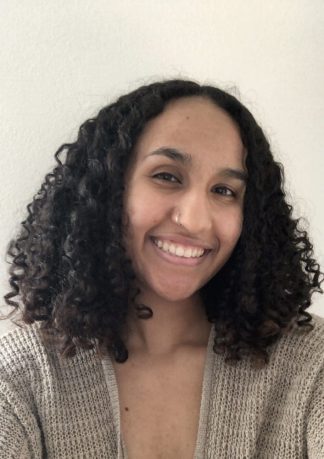By Allison Campbell Jensen

A thank you card for Kim Clarke
“She’s so adaptive,” says Wendy K. Anderson of Librarian Kim Clarke. The Communications Studies Professor regularly asks Clarke to come to her classes to help students. “Kim tailored her presentation to each course where I’ve had her in to talk with students.”
In the mix of departments that she serves — Communication Studies; Gender, Women & Sexuality Studies; Organizational Leadership, Policy, and Development; and Curriculum & Instruction — Clarke says she works with relatively high-touch students. Those in the helping professions are naturally curious about many things, she says, while others may be nontraditional in some way.
Matt Guilfoyle, for instance, returned to the University as a junior after a break of more than five years and is enrolled in Anderson’s Communication Ethics class this semester. “We have an annotated bibliography as one of the two main projects for our class and she [Clarke] essentially showed us how to navigate that,” Guilfoyle says. “The premise has been don’t procrastinate, do this early. But like a lot of people, I didn’t think it would be so hard.
“After her workshop, I thought, ‘Oh boy, this is going to be difficult.’ Having her show us some of the search options and having us find stuff during the workshop was nice,” he says.
Building relationships through teaching
Anderson appreciates Clarke’s expertise in the Libraries’ inner workings. “I rely on her,” she says, to keep up with changing technologies. Anderson also recognizes that Clarke’s class visits start to build students’ relationships with herself and the Libraries. “She has a love for the job and the students.”
Clarke has worked with this mix of departments for some 10 years. “I’ve been very intentional about talking with faculty and fitting into their departments,” she says. “It didn’t just happen.” When she has a faculty member who is new to her, Clarke will have a conversation about their class and ask for the assignment and/or syllabus.
“I like to see professors scaffolding or stepping out their assignments, because students really don’t know things,” Clarke says. “Professionals can be so removed from the process of learning that when we tell students, ‘We need you to do this thing and here’s the due date,’ we’re not really setting them up for success.” She praises those instructors who provide scaffolds and gently encourages others to do so.
After the conversation, she will send the professor an outline of what they discussed and a link to a slide deck. She has many now, so she generally can fit pieces together like Legos to suit the class. When students have access to a slide deck, they don’t need to try to write down every word but can pay better attention to the presentation. She asks the professor to encourage students to contact her for one-on-one consultations.
These days, however, “even before the class is half over, I have students emailing me: ‘Can you meet with me?’ It’s never happened before,” Clarke says. “Students are really seeing the benefits of a knowledge professional, an information professional, helping them during this time.”
And they like her approach. Guilfoyle says: “She was super-excited and very animated and wanted you to ask a lot of questions and made you want to ask questions.” She also pointed out that the Libraries have help available through 24/7 Chat, which he took advantage of.
Demystifying the academy
“I was a first-generation college student, and I still identify with that even though college is decades ago,” Clarke says. “I strive to be the librarian that I wanted and needed then.” When students have concerns about the University or the Libraries, she is happy to serve as a wayfinder. She talks with students about the issue and how they might resolve it.
“She was super-excited and very animated and wanted you to ask a lot of questions and made you want to ask questions.”
—Matt Guilfoyle
“That really resonates with people,” Clarke says. “Nobody wants to feel dumb. We should really normalize making mistakes because that’s the way you learn. People shouldn’t suffer; college is hard enough.”
When working with a group of researchers a few weeks ago, she did a live online search. “Because of distance education and working from home, they could see and hear exactly what I was doing. ‘Oh, that didn’t work so well . . . I’m going to re-jigger my search. Let me scan this.’ At the end,” Clarke says, “they said, ‘That was amazing.’ It was so nice to hear your running commentary, how you changed things, and your sorting process.”
She enjoys the puzzle-solving process and is glad they got something out of it. “I really want people to know that what I do is not mysterious, and it is something they can learn, too.” She wants to inspire people.
Several years ago, Clarke described herself as a teacher-librarian in a personal statement — and was told that was not a good thing. Now, it appears the general attitude toward teaching within the Libraries has changed. “Over time in the Libraries, teaching and learning has become of greater value. . . ,” she says. “We have some really challenging systems and there are people who really need and appreciate our help to get themselves to the next level.”
Representation matters

Olivia Webster
Olivia Webster, who graduated with a Communications degree a couple of years ago, vividly remembers Clarke’s presentation to her class with Anderson. “She demonstrated searches and said funny, clever things to help us remember her tips on how to look up quality research for college-level papers.” Clarke helped Webster with a paper on surveillance of students’ privacy, as well as her senior thesis on the absence of black males in films about higher education and how it helps support white supremacy and the prison industrial complex.
“She was just boom, boom, boom, with all these resources,” Webster says. It was a very busy time and Webster was quite appreciative. “We’re both women of color and having someone who looked like me — she helped me feel more inclusive and valuable.”
Clarke notes that 2017 statistics show that librarianship is 80% female and 86% white; most librarians of color work in public libraries. And, once, when she was a younger librarian meeting students for appointments, a white male scheduled to meet with her stumbled a bit when she greeted him, because he was “not expecting this person — who inhabits this body — to be his librarian.”
The seeds of her profession were planted early. When she was a youngster, Clarke’s father took her to a public library that had a Black librarian. Years later, Clarke ran into her at a library professional conference — and the woman remembered her. “‘What are you doing at this librarians conference?’ ‘I’m here because of you. I’m a librarian, too.’ So we had a moment. Because of her and my dad, that’s why I’m a librarian. He was able to find a librarian who looked like me, and he looked like me,” Clarke says. “So, representation matters.”
Welcome recognition
This semester, Anderson and her class sent Clarke a special thank you e-postcard. “She’s a unique gem. . . . She’s very accessible and valuable to the University,” Anderson says.
“The Libraries have an incredibly positive reputation on campus. I can’t help but think that some of that depends on our library workers.”
Clarke has received many thank you’s from faculty and from students. One recently said Clarke was the students’ best friend. “I’m happy to be part of this increased visibility around teaching and learning. And I am not special in this way; there are many, many other librarians around the University of Minnesota who think the way I do and do the work I do. I’m not alone.”
In addition, “the Libraries have an incredibly positive reputation on campus. I can’t help but think that some of that depends on our library workers. I’ve had people who have graduated or moved on from the University and come back to ask, ‘Can you help me with this thing? I’m at another university but their librarians don’t work the way you all do.’
“Customer service is really important to us. We have an amazingly positive relationship with folks on campus and we work really hard to maintain that.” Clarke is one of the reasons why.




